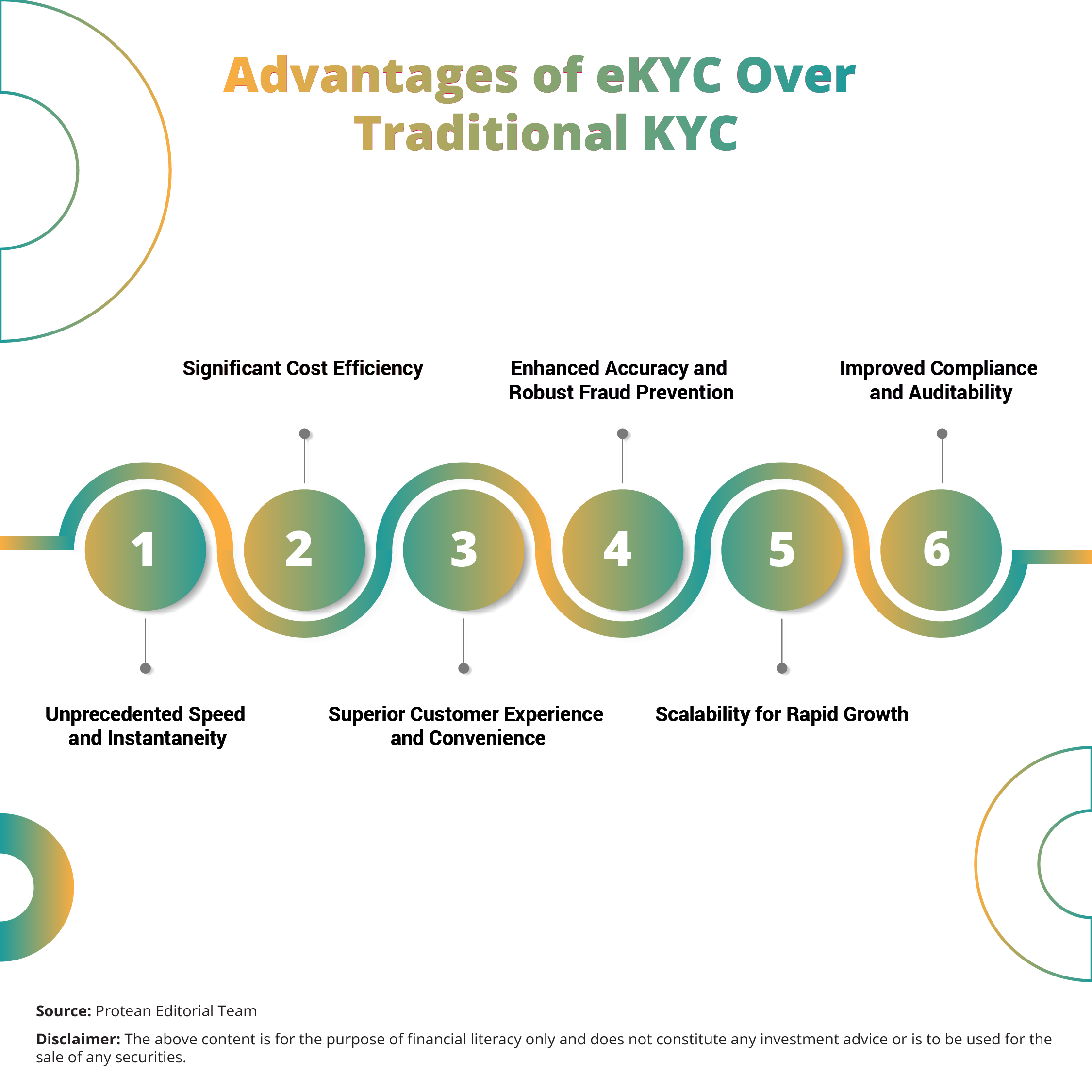Is eKYC or paperless KYC better than KYC? Let’s learn about KYC before we get to the eKYC or eKYC online comparison with traditional KYC.
In today’s digital-first economy, Know Your Customer (KYC) has become a foundational element in the evolving customer onboarding process, enabling organisations to:
- Verify identities
- Ensure regulatory compliance
- Prevent fraud
- Manage risk effectively.
KYC, or Know Your Customer, is a critical compliance process used by:
- Financial institutions
- Telecom providers
- Insurers
- NBFCs
- Other regulated businesses.
With KYC, you can prevent frauds and can verify the identity, address, and risk profile of their customers.
Traditional KYC Process
Historically, KYC has been a manual, paper-intensive process.
Here, customers were required to:
- Fill out physical forms
- Submit photocopies of identity and address proofs (such as PAN, Aadhaar, or passport)
- Visit a branch or service point for in-person verification.
Businesses had to do the following tasks:
- Collect documents
- Verify documents
- Store documents
- Retrieve documents.
The process was slow, labour-intensive, error-prone, and costly. Moreover, physical storage posed challenges in record management, data security, and audit readiness.
eKYC and Digital KYC Process
With digital transformation gaining momentum, electronic Know Your Customer (eKYC) has emerged as a game-changer.
eKYC online has enabled the digital capture, verification, and authentication of identity, significantly streamlining the onboarding process. eKYC takes this one step further by allowing remote verification through internet-based platforms, eliminating the need for physical interaction altogether.

Advantages of eKYC Over Traditional KYC
The following are the main advantages of eKYC online process:
1. Unprecedented Speed and Instantaneity
Traditional KYC might take several days, especially in cases requiring physical visits or couriered documents.
In contrast, eKYC, especially Aadhaar eKYC can complete verification in real time, often in under five minutes.
This can dramatically reduce onboarding timelines. Thus, it allows businesses to activate services instantly and enhance customer conversion rates.
2. Significant Cost Efficiency
Manual KYC can involve various operational costs such as paper processing, printing, courier services, staffing, and physical document storage.
In comparison, eKYC can streamline the process and significantly reduce these expenses. Industry estimates indicate that Aadhaar eKYC can reduce customer acquisition costs, making it a practical solution for high-volume businesses such as telecom operators and NBFCs.
Learn more about Aadhaar eKYC here.
3. Superior Customer Experience and Convenience
Modern customers expect fast, digital experiences, and online eKYC allows them to verify their identities from home with a smartphone or laptop. This convenience not only improves customer satisfaction but also reduces drop‑off rates during onboarding, which is particularly important for digital lenders, insurance aggregators, and fintech platforms.
4. Enhanced Accuracy and Robust Fraud Prevention
Manual KYC is susceptible to data entry errors, document mismatches, and even forgery. eKYC significantly improves accuracy through system-based validations, automated checks, and integration with verified government databases. Aadhaar eKYC, for example, uses OTP or biometric authentication to ensure the identity truly belongs to the user. This adds a robust layer of fraud prevention and identity assurance.
5. Scalability for Rapid Growth
eKYC online systems can handle high volumes without a proportionate increase in manpower or infrastructure. Whether a business is onboarding 100 or 1 lakh customers, the marginal cost of scaling remains low. This makes eKYC ideal for fast-growing startups, pan-India financial institutions, and digital service providers targeting rural and semi-urban markets.
6. Improved Compliance and Auditability
Every step in an eKYC process is electronically recorded, time-stamped, and securely stored. This provides a reliable audit trail, which is critical for internal governance, regulatory inspections, and dispute resolution.
Moreover, using API-based systems can ensure consistent adherence to evolving norms issued by regulators such as RBI, SEBI, IRDAI, and UIDAI.
Key Types of eKYC in India
India’s regulatory and technology ecosystem has enabled multiple forms of eKYC:
- Aadhaar eKYC (OTP/Biometric Based): This is the most widely used form of eKYC. It enables authentication through Aadhaar number and OTP or biometric data, with UIDAI as the central verification authority.
- DigiLocker Integration: DigiLocker allows customers to share government-issued documents digitally with service providers. These digital copies are legally valid and streamline verification processes.
- Other Digital Methods: eKYC can also be carried out using APIs for PAN verification, bank account validation, and document OCR, enhancing flexibility for different use cases.
Conclusion
eKYC represents a shift from traditional KYC to a digital first approach to customer onboarding. They can offer clear improvements in speed, cost efficiency, user experience, security, and compliance. As regulatory requirements continue to evolve and customer expectations grow, businesses across sectors including banking, telecom, fintech, and insurance are increasingly viewing eKYC as a necessary component of their operations.

